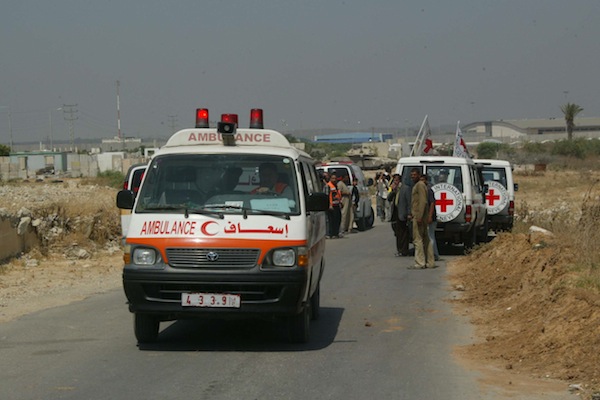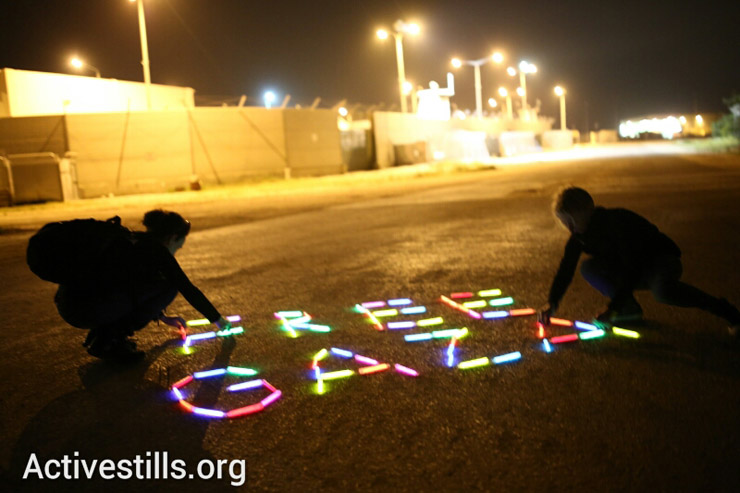Abed al-Karim Abu Haloub has been in a coma in Gaza for over 40 days, requiring treatment in the West Bank. Israel repeatedly refused to allow him to leave.

Israeli authorities repeatedly refused to allow a Palestinian man from the Gaza Strip to receive medical treatment in the West Bank, denying his travel permit on security grounds, despite the fact that he has been in a coma for over a month.
Physicians for Human Rights—Israel (PHR) attempted to intervene on the Abed al-Karim Abu Haloub’s behalf, twice appealing the decision to reject his permit request to no avail. The fact that Abu Haloub is comatose and connected to a ventilator was not enough to allay Israel’s concerns that he might pose a security threat.
The Shin Bet and IDF only lifted the security ban when faced with the prospect of the absurd refusal being exposed publicly, when Walla! News journalist Shabtai Bendat began inquiring about the case.
Abed al-Karim Abu Haloub has been in a coma in a Gaza Strip hospital for over 40 days and requires treatment that isn’t available in the Strip. The first request for a permit to move him to a hospital in Hebron was sent to the Israeli military in late October.
“According to medical records, the patient’s condition has significantly deteriorated and his life is in immediate danger,” Physicians for Human Rights wrote to the Israeli army in the letter appealing its rejection of the entry permit.
“His incapacitated condition and his inability to function makes your rejection on security grounds illogical,” the letter continued, according to Walla!. “In accordance with international law and Israeli legal precedents, it is Israel’s responsibility to allow a patient to receive medical care outside of the Gaza Strip.”
According to PHR, Abed al-Karim Abu Haloub’s is just one case reflective of a worrying trend over the past year in which Israel rejects travel permits for Palestinian patients who require treatment outside of Gaza. Many of those patients were being treated for serious illnesses like cancer or heart conditions, a number of whom had already begun life-saving treatments in Israeli or West Bank hospitals.
The avenues for challenging security blocks available to Palestinians are also becoming less effective, according to data published by PHR earlier this year. Whereas PHR says it was successful in overturning rejected permit requests over 60 percent in 2015, only 25 percent of rejected permit applications were reversed in the first half of 2016.

Israel withdrew its troops from the Gaza Strip 10 years ago but its military still controls its land and sea borders, airspace, maritime zone, population registry, and decides which people and what goods may enter and exit the Strip. While Gaza also has a land border with Egypt, the Rafah crossing is a passenger terminal only, is often closed; it has only been open 32 days in all of 2016, and most of that time only for humanitarian cases and to facilitate the Muslim pilgrimage.
In a report about its preliminary examination into alleged war crimes committed by Israel and Palestinians published this month, the International Criminal Court (ICC) prosecutor wrote, “it may be argued that Israel nonetheless remains an occupying power as a result of the scope and degree of control that Israel has retained over the territory of Gaza – a position that the Office [of the ICC Prosecutor] has previously taken.”
In a response provided to Walla! News, Israel’s Shin Bet security agency defended its initial decision to reject Abu Haloub’s entry permit by citing what it described as terrorist organizations trying to exploit Israel’s humanitarian policies.
“A string of cases were discovered in which medical reports were forged for Gaza Strip residents who requested to enter Israel for medical treatment,” the Shin Bet told Walla!. “Abed al-Karim Abu Haloub’s request was re-examined by security officials and it was decided to approve his entry into Israel, subject to the verification of his medical state upon arrival at the [border] crossing.”
In a 2015 New York Times profile on a growing market of false medical recommendations for exit permits in Gaza, Dr. Bassem al-Badri, the Palestinian medical official who runs Gaza’s medical referral office, assessed that some 10 percent the people requesting medical permits did not actually need medical care.
Twice rejecting a comatose man’s access to medical care, only approving it once approached by the media, suggests that authorities did not have genuine security concerns. The only conclusion is that they did not even examine Mr. Abu Haloub’s case, and used broad “security” grounds as an excuse to reject it out of hand, like is increasingly the case with permits of all types.


